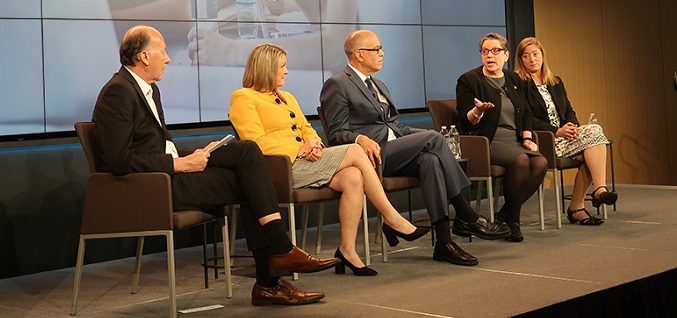Partnerships essential for career pathways
By Ellie Ashford
November 13, 2019
Effective career pathways leading to good jobs require strong partnerships with employers, good use of data and outreach to underserved populations, community college leaders agreed at a panel discussion hosted by the Urban Institute.
Meaningful partnerships with employers are important to ensure students will be able to earn good wages and advance beyond an entry-level job, said Anne Kress, president of Monroe Community College (MCC) in New York and a member of the American Association of Community Colleges’ board of directors.
It’s critical to have conversations with employers on the nature of work and what skills are needed, added Mildred Coyne, senior vice president for workforce education and innovation at Broward College in Florida.
To address a nursing shortage in Broward County, Coyne described how the Memorial Healthcare System formed a consortium of hospitals that guarantee jobs for graduates and support continuing education for those who become licensed.
Broward also helped form a paid apprenticeship program for students earning college credits in information technology and who start with no IT skills, Coyne said.
Scalability is a challenge at large colleges, she acknowledged. Broward placed 1,200 students in paid internships, but that’s a small number at a college with 63,000 students.
Six key strategies
Partnerships with employers and community organizations are one of six key strategies important for the success of career pathways identified in a study by Abt Associates. They are particularly important to ensure students learn about job opportunities, and for employers to see students from underrepresented groups as a source of talent whom they might otherwise neglect, said Julie Strawn, principal researcher at Abt.
Strawn said the other effective strategies include: a structure with a clear roadmap for getting through a pathway; financial aid for help with living expenses, as well as tuition and fees; career navigators and advisors; work-based learning; and embedded foundational skills.
Examples of effective programs cited by Strawn include I-BEST, a program that integrates developmental education and job training; Project Quest, which provides wraparound services in San Antonio, Texas, to help residents complete job training programs at community colleges; and CUNY ASAP, which provides services, tuition waivers and class scheduling priorities to help students complete an associate degree within three years.
Analyze labor data
The concept of a career pathway is more like a vortex than a clear linear path, said Julian Alssid, vice president of workforce development at the Community College of Rhode Island (CCRI). That’s because the skills required by employers keep evolving in response to changes in the economy and innovations in technology.
CCRI uses a just-in-time approach to analyze labor data and ensure the college provides the right mix of academics, career and technical training and exposure to the workforce, Alssid said.
As an example, CCRI created a course on basic data skills to respond to manufacturing, IT and other companies’ needs for people with that skill set.
Reach underserved populations
“We have to meet students where they are,” said Coyne, who notes that while most residents of Broward County are doing well economically, the college serves six zip codes with high unemployment and low educational attainment rates.
To reach underserved populations, the college works with its community partners to provide training programs in underutilized spaces. Students in the poorest zip codes can take free classes near their homes leading to certifications in IT, manufacturing and supply chain systems.
The challenge for MCC is educating people about job opportunities in a region with a 50 percent high school graduation rate, Kress said. To reach that population, MCC informs dual-enrollment students about the high-tech nature of advanced manufacturing jobs. It also provides a three-week summer session where high school students can earn college credits and meet employers.
“A big part of our work is getting people to understand what careers are there,” Kress said. As an example, she noted that many people think the only jobs available in hospitals are doctors and nurses; they don’t know about opportunities in bioinformatics and allied health professions.
Kress urged colleges to educate students and their families about careers, take them to workplaces and bring in employers who are honest about what people can expect to earn.
The question for Kress is “how do we support the whole student?” For MCC, that means providing drop-in childcare, free bus passes for anyone with a student ID, a food pantry on campus, and scheduling classes for parents when their children are in school.
There’s more to the story! Read the full article in CC Daily.


